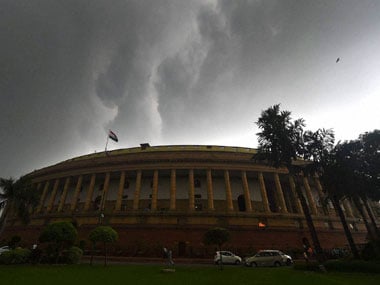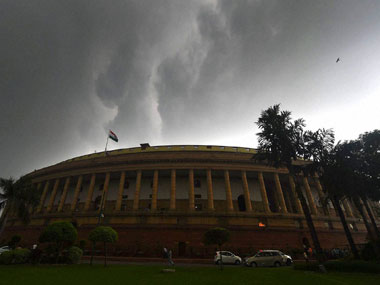The Supreme court has justifiably re-emphasised the existence of a Lakshman Rekha that delineates the boundary between the judiciary and the legislature. A three-member bench headed by Chief Justice H L Dattu rejected the petition of an NGO — Foundation for Restoration of National Values — that sought the SC’s indulgence over the wastage of public money by disrupting the functioning of Parliament. “We know the Lakshman Rekha and courts should not cross the Lakshman Rekha. This court is not monitoring Parliament and parliamentarians,” the court said, ruling out the possibility of laying down guidelines as how to run Parliament effectively. [caption id=“attachment_2445936” align=“alignleft” width=“380”]  PTI image.[/caption] There is little doubt that the disruption of Parliament at the slightest pretext has become a regular and unsavoury feature of Indian legislature’s conduct. The petition was filed in the context of people’s anger that has been welling up over the years for the unbecoming and unaccountable behaviour of legislators, often backed by and even stoked by party leaders. Just this July-August, 44 ‘honourable members’ of the Congress held the Lok Sabha to ransom by disrupting the House for the entire Monsoon session. But this is not about one party. The Congress was only returning the favour to the BJP which conducted itself in a similar manner and stalled crucial legislations that had far-reaching consequences for the country. The malaise is deep and party-agnostic. It has come to a stage where personal prejudices and hostilities are getting translated into a political action of parties and their leaders. If the GST piloted by the UPA is unacceptable to the BJP, it will be opposed in equal measure by the Congress in the NDA regime even if they (Congress) conceived it originally. Similarly, though a section of the Congress chief ministers found the land acquisition bill a major hurdle for development, it would not allow passage because the BJP dared make amendments. The petition before the SC should be seen as a desperate measure on behalf of the people of India to draw the apex court to enforce a sense of accountability and discipline among legislators. That is the level of frustration with our people’s representatives. But the court’s intervention in the functioning of the legislature would amount to tinkering with the basic structure of our Constitution. “House is a master of its own business” is an abiding principle that guides the functioning of the legislative bodies in India. The SC’s decision to stay away emanates from this understanding of the Constitution. So, no harm caused there. But in its taking up and rejecting of the petition itself there are two worrisome messages: One, the impression that legislators are an unruly lot and deserve to be governed by an external mechanism is a sad commentary on their functioning (or non-functioning). That is also indicative of the fact that the broad contours of political consensus are getting increasingly blurred at the altar of expediency. Even issues like foreign affairs, national security, economic and administrative reforms evoke bitter conflicts based primarily on subjective understanding and prejudices. And, two, the fact that the Supreme Court admitted and heard the case itself suggests the seriousness this issue has assumed. This shows that the cantankerous conduct of legislators that often defies norms of civility has substantially mobilised people’s opinion against law-makers. Many people must have been disappointed that the apex court chose to (rightly) stay away from the issue because there is nothing the tax-paying public can do about the dishonourable behaviour of our honourable members. That’s not a great place to be in. The Supreme Court might have reinforced the Lakshman Rekha by refusing to cross it, but do our legislators know where it is?
There is little doubt that the disruption of Parliament at the slightest pretext has become a regular and unsavoury feature of Indian legislature’s conduct.
Advertisement
End of Article


)
)
)
)
)
)
)
)
)



